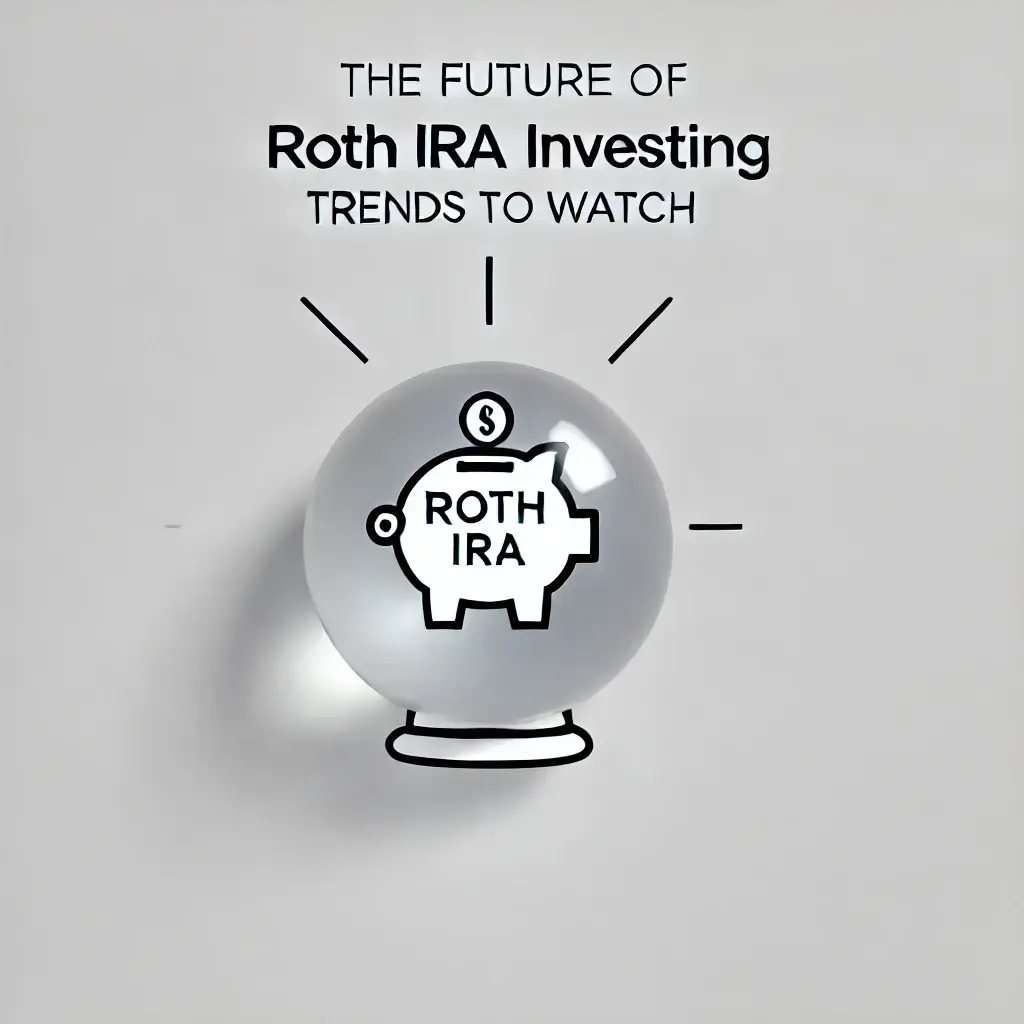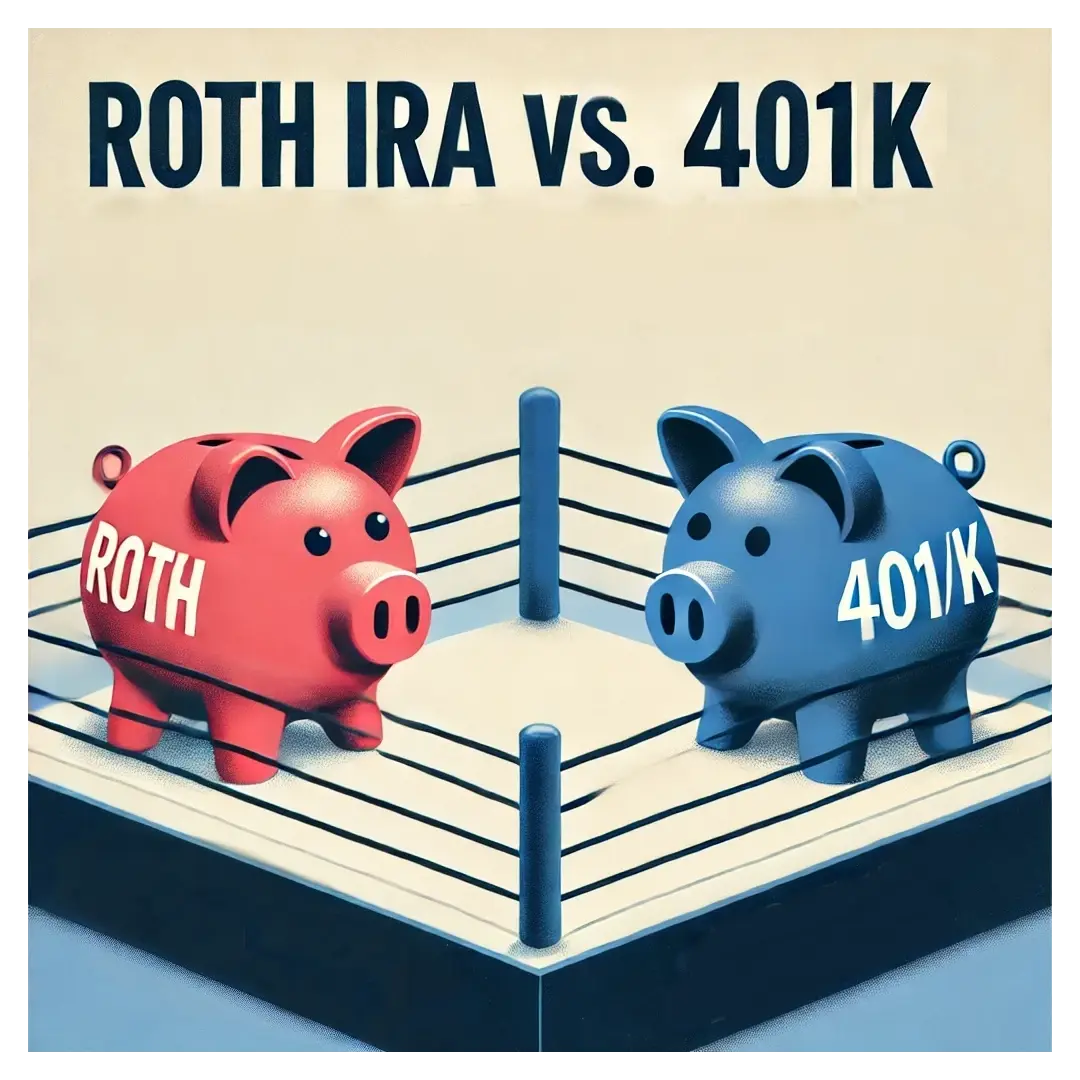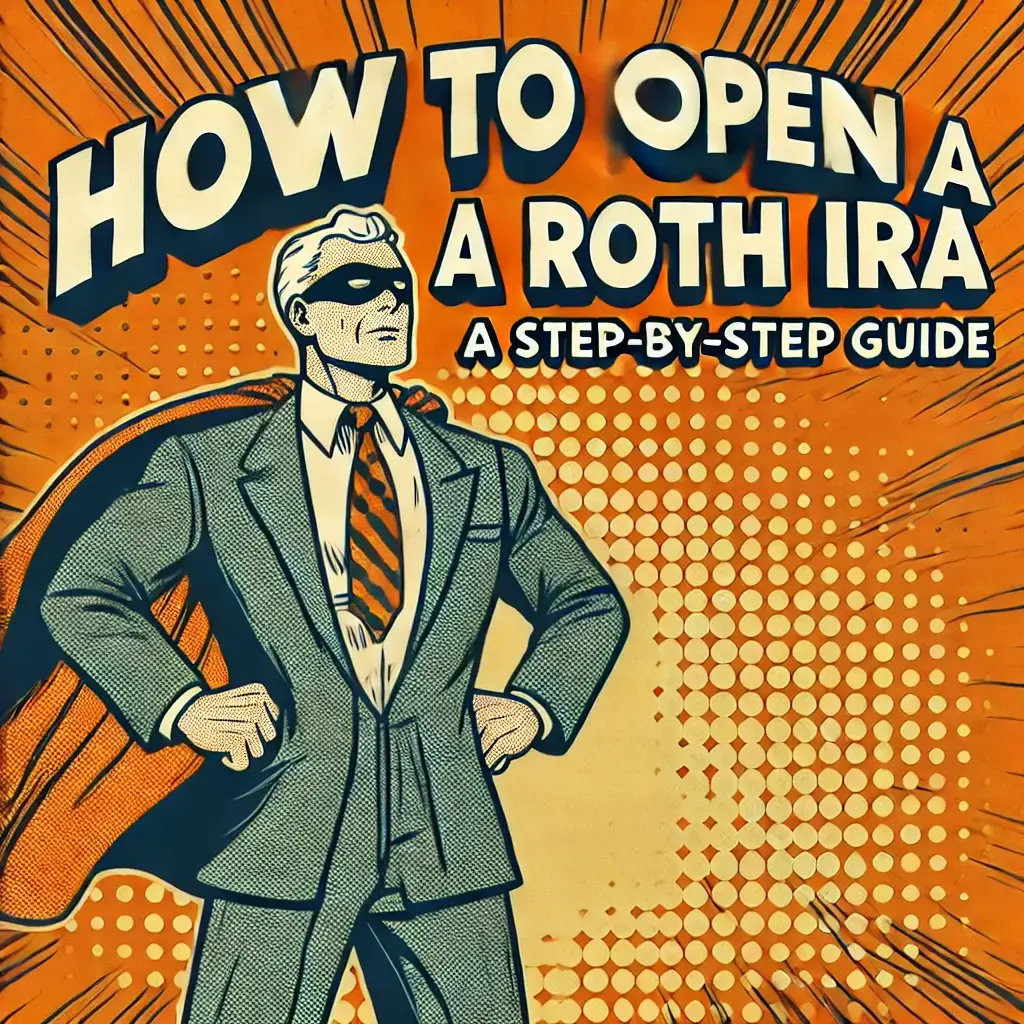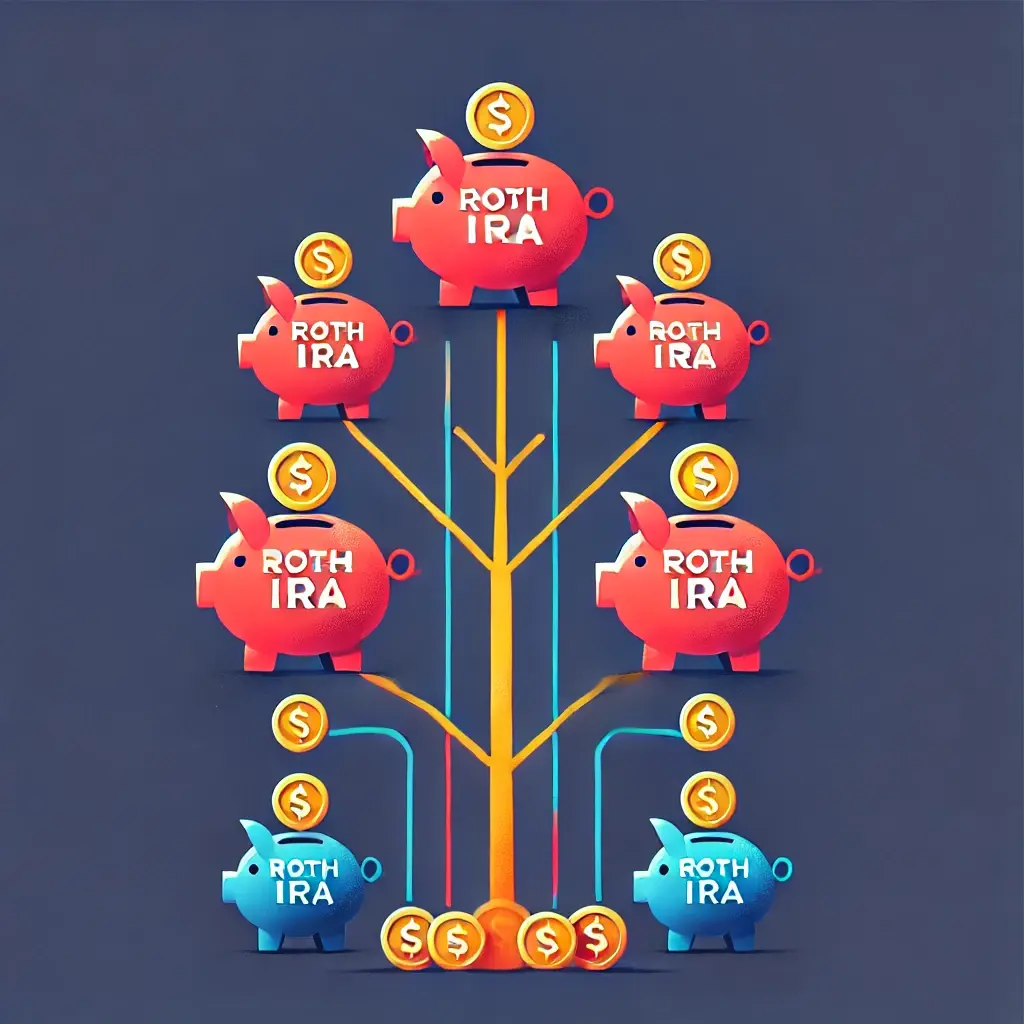
Roth IRA
A Roth IRA (Individual Retirement Account) is a type of retirement savings account in the United States that allows individuals to contribute after-tax income, with the benefit of tax-free growth and tax-free withdrawals in retirement. Contributions to a Roth IRA are made with money that has already been taxed, so qualified distributions (those made after age 59½ and after the account has been open for at least five years) are not subject to federal income tax. Unlike traditional IRAs, Roth IRAs do not have required minimum distributions (RMDs) during the account holder's lifetime. Roth IRAs are popular for those who expect to be in a higher tax bracket in retirement or who prefer tax-free income in their later years.
Roth IRA Guide




Roth IRA Glossary
- Account Flexibility(Noun)
- /uh-kount flek-suh-bil-i-tee/
- Definition: The ability of a Roth IRA to allow account holders to manage their investments and make contributions or withdrawals with fewer restrictions compared to other retirement accounts, offering greater control over financial planning.
- Etymology: "Account" from Old French "aconter," meaning "to reckon or compute," and "flexibility" from Latin "flexibilis," meaning "pliant or adaptable." Account flexibility refers to the ease with which one can manage and adjust a Roth IRA.
- Similar: Account adaptability, Investment flexibility
- Opposite: Account rigidity
- Example: "The account flexibility of a Roth IRA allows you to make changes to your investments as your financial needs evolve."
- Account Holder’s Death(Noun)
- /uh-kount hohl-derz deth/
- Definition: The event in which the owner of a Roth IRA passes away, triggering specific rules and options for beneficiaries regarding the distribution or continued management of the inherited account.
- Etymology: "Account" from Old French "aconter," meaning "to reckon or compute," and "holder" from Old English "healdan," meaning "to hold," with "death" from Old English "dēath," meaning "the end of life." This term refers to the transfer and management of a Roth IRA after the owner's death.
- Similar: Account owner’s death, IRA holder’s passing
- Opposite: Account holder’s life
- Example: "Upon the account holder’s death, the Roth IRA typically passes to the named beneficiaries with specific distribution rules."
- Account Inheritance(Noun)
- /uh-kount in-her-i-tuhns/
- Definition: The process by which a Roth IRA is passed to beneficiaries upon the death of the account holder, allowing them to continue benefiting from tax-free growth or take distributions according to IRS rules.
- Etymology: "Account" from Old French "aconter," meaning "to reckon or compute," and "inheritance" from Latin "hereditare," meaning "to make an heir." Account inheritance refers to the transfer of a Roth IRA to heirs.
- Similar: IRA inheritance, Beneficiary transfer
- Opposite: Non-inheritance
- Example: "Account inheritance rules for Roth IRAs allow beneficiaries to receive the account without owing income taxes on the distributions."
- Age 59½ Rule(Noun)
- /eyj fif-tee-nahyn and uh-haf rool/
- Definition: The IRS rule that allows Roth IRA account holders to withdraw earnings tax-free and penalty-free after reaching age 59½, provided the account has been open for at least five years.
- Etymology: "Age" from Old French "aage," meaning "period of life," and "rule" from Latin "regula," meaning "straight stick." The Age 59½ Rule determines when penalty-free withdrawals from a Roth IRA can occur.
- Similar: 59½ withdrawal rule, Roth age rule
- Opposite: Early withdrawal rule
- Example: "The Age 59½ Rule allows you to withdraw Roth IRA earnings tax-free, provided you've met the five-year requirement."
- Beneficiary Distribution(Noun)
- /ben-uh-fish-er-ee dis-truh-byoo-shuhn/
- Definition: The process by which the assets of a Roth IRA are distributed to the designated beneficiaries upon the death of the account holder, with specific rules regarding timing and tax implications.
- Etymology: "Beneficiary" from Latin "beneficium," meaning "a favor or benefit," and "distribution" from Latin "distributio," meaning "a division." Beneficiary distribution involves the transfer of Roth IRA assets to heirs.
- Similar: Inherited distribution, Beneficiary payout
- Opposite: Non-distribution
- Example: "Beneficiary distributions from a Roth IRA can be taken as a lump sum or over time, depending on the plan’s rules."
- Contribution Adjustments(Noun)
- /kon-truh-byoo-shuhn uh-juhst-muhnts/
- Definition: Changes made to the amount or frequency of contributions to a Roth IRA based on changes in income, tax strategy, or retirement planning goals, allowing for flexible financial management.
- Etymology: "Contribution" from Latin "contribuere," meaning "to bring together," and "adjustments" from Latin "adjuxtare," meaning "to bring into order." Contribution adjustments allow fine-tuning of savings in a Roth IRA.
- Similar: Contribution changes, Savings adjustments
- Opposite: Fixed contributions
- Example: "Regular contribution adjustments can help you stay on track with your retirement savings goals in your Roth IRA."
- Contribution Flexibility(Noun)
- /kon-truh-byoo-shuhn flek-suh-bil-i-tee/
- Definition: The ability to adjust or pause contributions to a Roth IRA without penalties, giving account holders the freedom to manage their savings according to changing financial circumstances.
- Etymology: "Contribution" from Latin "contribuere," meaning "to bring together," and "flexibility" from Latin "flexibilis," meaning "pliant or adaptable." Contribution flexibility refers to the ease of modifying contributions to a Roth IRA.
- Similar: Contribution adaptability, Flexible savings
- Opposite: Rigid contributions
- Example: "The contribution flexibility of a Roth IRA is ideal for those with fluctuating incomes or financial obligations."
- Contribution Growth(Noun)
- /kon-truh-byoo-shuhn grohth/
- Definition: The increase in value of contributions made to a Roth IRA over time, primarily due to investment gains, which accumulates tax-free and can be withdrawn tax-free after certain conditions are met.
- Etymology: "Contribution" from Latin "contribuere," meaning "to bring together," and "growth" from Old English "growan," meaning "to grow." Contribution growth is the increase in value of Roth IRA savings over time.
- Similar: Investment growth, Tax-free growth
- Opposite: Contribution decline
- Example: "Monitoring contribution growth in your Roth IRA can help you assess if you're on track to meet your retirement goals."
- Contribution Phase-Out(Noun)
- /kon-truh-byoo-shuhn feyz-out/
- Definition: The gradual reduction of allowable Roth IRA contributions based on income levels, as determined by IRS guidelines, which limits contributions for high-income earners.
- Etymology: "Contribution" from Latin "contribuere," meaning "to bring together," and "phase-out" from Greek "phasis," meaning "appearance" and "out" from Old English "ūt," meaning "outward." Contribution phase-out reduces Roth IRA contributions based on income.
- Similar: Contribution limit, Income phase-out
- Opposite: Full contribution
- Example: "High-income earners need to be aware of the contribution phase-out limits when planning Roth IRA contributions."
- Contribution Reversal(Noun)
- /kon-truh-byoo-shuhn ri-vur-suhl/
- Definition: The process of undoing or withdrawing contributions made to a Roth IRA, typically due to excess contributions, within a certain timeframe to avoid taxes and penalties.
- Etymology: "Contribution" from Latin "contribuere," meaning "to bring together," and "reversal" from Latin "reversus," meaning "turned back." Contribution reversal corrects excess contributions to a Roth IRA.
- Similar: Contribution retraction, Excess contribution withdrawal
- Opposite: Contribution continuation
- Example: "If you exceed the Roth IRA contribution limits, a contribution reversal can help you avoid penalties."
- Contribution Strategy(Noun)
- /kon-truh-byoo-shuhn strat-uh-jee/
- Definition: A planned approach to making contributions to a Roth IRA, taking into account factors like income, tax brackets, and long-term financial goals to maximize retirement savings.
- Etymology: "Contribution" from Latin "contribuere," meaning "to bring together," and "strategy" from Greek "strategia," meaning "generalship." A contribution strategy optimizes Roth IRA savings.
- Similar: Savings strategy, Contribution plan
- Opposite: Unplanned contributions
- Example: "A well-thought-out contribution strategy can significantly enhance the growth of your Roth IRA over time."
- Contribution Timing(Noun)
- /kon-truh-byoo-shuhn tahy-ming/
- Definition: The strategic timing of making contributions to a Roth IRA, which can be influenced by factors such as income fluctuations, market conditions, and tax planning considerations.
- Etymology: "Contribution" from Latin "contribuere," meaning "to bring together," and "timing" from Old English "tima," meaning "time or period." Contribution timing affects the impact of Roth IRA savings.
- Similar: Savings timing, Contribution schedule
- Opposite: Random contributions
- Example: "Optimizing contribution timing can help you take advantage of market conditions and maximize your Roth IRA growth."
- Conversion Eligibility(Noun)
- /kuhn-vur-zhuhn ih-lij-uh-bil-i-tee/
- Definition: The criteria that determine whether an individual can convert funds from a traditional IRA or other retirement accounts into a Roth IRA, often based on income limits and tax implications.
- Etymology: "Conversion" from Latin "convertere," meaning "to turn around," and "eligibility" from Latin "eligibilis," meaning "able to be chosen." Conversion eligibility determines if you can convert to a Roth IRA.
- Similar: Conversion qualification, Eligibility for conversion
- Opposite: Conversion ineligibility
- Example: "Understanding conversion eligibility is crucial before moving funds into a Roth IRA to avoid unexpected taxes."
- Conversion Ladder(Noun)
- /kuhn-vur-zhuhn lad-er/
- Definition: A strategy involving the gradual conversion of traditional IRA or 401(k) funds to a Roth IRA over several years, aimed at managing tax liability by staying within lower tax brackets.
- Etymology: "Conversion" from Latin "convertere," meaning "to turn around," and "ladder" from Old English "hlæder," meaning "a series of steps." A conversion ladder spreads Roth IRA conversions over time.
- Similar: Roth conversion ladder, Gradual conversion
- Opposite: Lump-sum conversion
- Example: "A conversion ladder can help you move funds into a Roth IRA while minimizing tax impact each year."
- Conversion Taxation(Noun)
- /kuhn-vur-zhuhn tak-sey-shuhn/
- Definition: The taxes owed when converting funds from a traditional IRA or 401(k) to a Roth IRA, as the converted amount is treated as taxable income in the year of conversion.
- Etymology: "Conversion" from Latin "convertere," meaning "to turn around," and "taxation" from Latin "taxare," meaning "to assess." Conversion taxation is the tax liability incurred when converting to a Roth IRA.
- Similar: Conversion taxes, Roth conversion tax
- Opposite: Tax-free conversion
- Example: "Understanding conversion taxation is essential to avoid a significant tax bill when moving funds to a Roth IRA."
- Direct Contribution(Noun)
- /dih-rekt kon-truh-byoo-shuhn/
- Definition: Contributions made directly to a Roth IRA from earned income, subject to annual contribution limits set by the IRS, without the need for a rollover or conversion.
- Etymology: "Direct" from Latin "directus," meaning "straight," and "contribution" from Latin "contribuere," meaning "to bring together." Direct contributions are straightforward deposits into a Roth IRA.
- Similar: Direct deposit, Straight contribution
- Opposite: Indirect contribution
- Example: "Making direct contributions to your Roth IRA is a simple way to build your retirement savings over time."
- Disability Exceptions(Noun)
- /dis-uh-bil-i-tee ik-sep-shuhnz/
- Definition: Special rules that allow Roth IRA account holders to withdraw funds before age 59½ without penalties if they become disabled, providing financial support during challenging times.
- Etymology: "Disability" from Latin "disabilitas," meaning "inability," and "exceptions" from Latin "excipere," meaning "to take out." Disability exceptions allow penalty-free Roth IRA withdrawals in cases of disability.
- Similar: Disability withdrawal rule, Penalty exception
- Opposite: Penalty imposition
- Example: "If you qualify for disability exceptions, you can access your Roth IRA funds without the typical early withdrawal penalties."
- Distribution Timing(Noun)
- /dis-truh-byoo-shuhn tahy-ming/
- Definition: The strategic timing of taking distributions from a Roth IRA, considering factors like tax implications, retirement income needs, and the five-year rule, to optimize financial outcomes.
- Etymology: "Distribution" from Latin "distributio," meaning "a division," and "timing" from Old English "tima," meaning "time or period." Distribution timing affects the tax efficiency and benefits of Roth IRA withdrawals.
- Similar: Withdrawal timing, Payout schedule
- Opposite: Random distributions
- Example: "Proper distribution timing from your Roth IRA can help minimize taxes and maximize your retirement income."
- Early Access to Funds(Noun)
- /ur-lee ak-ses too fuhndz/
- Definition: The ability to withdraw contributions (but not earnings) from a Roth IRA at any time without taxes or penalties, providing financial flexibility in emergencies or other situations.
- Etymology: "Early" from Old English "ærlice," meaning "soon," and "access" from Latin "accessus," meaning "a coming to," and "funds" from Latin "fundus," meaning "bottom or base." Early access to funds allows penalty-free Roth IRA contributions withdrawal.
- Similar: Early withdrawal, Penalty-free access
- Opposite: Restricted access
- Example: "One of the benefits of a Roth IRA is early access to funds without penalties, giving you flexibility if unexpected expenses arise."
- Early Withdrawal Exceptions(Noun)
- /ur-lee with-draw-uhl ik-sep-shuhnz/
- Definition: Specific circumstances under which Roth IRA account holders can withdraw earnings before age 59½ without incurring the 10% early withdrawal penalty, such as for first-time home purchases or qualified education expenses.
- Etymology: "Early" from Old English "ærlice," meaning "soon," "withdrawal" from Old English "wiðdragan," meaning "to draw back," and "exceptions" from Latin "excipere," meaning "to take out." Early withdrawal exceptions allow penalty-free Roth IRA earnings access under specific conditions.
- Similar: Penalty-free withdrawal, Special withdrawal rule
- Opposite: Penalty imposition
- Example: "There are early withdrawal exceptions for Roth IRAs, such as using funds for a first-time home purchase."
- Earnings Distribution(Noun)
- /ur-ningz dis-truh-byoo-shuhn/
- Definition: The withdrawal of investment earnings from a Roth IRA, which can be tax-free if the account holder meets the five-year rule and is over age 59½ or qualifies for an exception.
- Etymology: "Earnings" from Old English "earnian," meaning "to earn," and "distribution" from Latin "distributio," meaning "a division." Earnings distribution refers to the withdrawal of accumulated investment gains from a Roth IRA.
- Similar: Earnings withdrawal, Investment distribution
- Opposite: Contribution distribution
- Example: "Earnings distributions from a Roth IRA are tax-free if the account has been open for at least five years and you're over age 59½."
- Estate Planning Tool(Noun)
- /ih-steyt plan-ing tool/
- Definition: A Roth IRA can be used as an estate planning tool because it allows for tax-free transfers of assets to beneficiaries, with no required minimum distributions during the account holder’s lifetime.
- Etymology: "Estate" from Old French "estat," meaning "state or condition," "planning" from Latin "planus," meaning "flat or level," and "tool" from Old English "tol," meaning "instrument." Estate planning tool refers to using a Roth IRA for wealth transfer planning.
- Similar: Wealth transfer tool, Legacy planning tool
- Opposite: Non-estate planning tool
- Example: "Using a Roth IRA as an estate planning tool can help your heirs avoid taxes on the inherited assets."
- First-Time Homebuyer Rule(Noun)
- /furst tahym hohm-bahy-er rool/
- Definition: A provision that allows Roth IRA account holders to withdraw up to $10,000 in earnings penalty-free for a first-time home purchase, provided the account has been open for at least five years.
- Etymology: "First-time" from Old English "fyrst," meaning "foremost," "homebuyer" from Old English "hām," meaning "dwelling," and "buyer" from Old English "bycgan," meaning "to purchase." The first-time homebuyer rule facilitates home purchases using Roth IRA funds.
- Similar: Homebuyer exception, Roth home purchase rule
- Opposite: Non-homebuyer rule
- Example: "The first-time homebuyer rule allows you to use Roth IRA funds for a down payment without facing early withdrawal penalties."
- Five-Year Rule(Noun)
- /fahyv yeer rool/
- Definition: The IRS rule that requires Roth IRA accounts to be open for at least five years before earnings can be withdrawn tax-free, regardless of the account holder's age.
- Etymology: "Five" from Old English "fif," meaning "five," "year" from Old English "geār," meaning "year," and "rule" from Latin "regula," meaning "straight stick." The five-year rule determines the tax status of Roth IRA earnings withdrawals.
- Similar: Five-year waiting period, Roth qualification rule
- Opposite: Immediate access rule
- Example: "To withdraw earnings tax-free, your Roth IRA must meet the five-year rule, even if you're over 59½."
- Flexibility in Retirement(Noun)
- /flek-suh-bil-i-tee in ri-tahyuh r-muhnt/
- Definition: The ability to access Roth IRA funds without required minimum distributions (RMDs) or penalties, allowing retirees to manage their income and tax liabilities more effectively.
- Etymology: "Flexibility" from Latin "flexibilis," meaning "pliant or adaptable," and "retirement" from French "retirer," meaning "to withdraw." Flexibility in retirement allows Roth IRA account holders to control their withdrawals.
- Similar: Retirement adaptability, Income flexibility
- Opposite: Retirement rigidity
- Example: "Roth IRAs offer flexibility in retirement, allowing you to withdraw funds when needed without worrying about RMDs."
- High-Income Limits(Noun)
- /hahy in-kuhm lim-its/
- Definition: The income thresholds set by the IRS that restrict or phase out the ability to contribute directly to a Roth IRA, requiring high earners to explore alternative strategies like backdoor Roth IRAs.
- Etymology: "High" from Old English "heah," meaning "elevated," "income" from Latin "incom," meaning "coming in," and "limits" from Latin "limitem," meaning "boundary." High-income limits determine Roth IRA contribution eligibility.
- Similar: Income thresholds, Contribution limits
- Opposite: Low-income eligibility
- Example: "If your earnings exceed the high-income limits, you may not qualify to contribute directly to a Roth IRA."
- Higher Education Expenses(Noun)
- /hahy-er ej-oo-key-shuhn ik-spens-iz/
- Definition: Qualified expenses for tuition, fees, books, and sometimes room and board, which can be paid for with Roth IRA withdrawals without incurring the 10% early withdrawal penalty, though taxes on earnings may apply.
- Etymology: "Higher" from Old English "heah," meaning "elevated," "education" from Latin "educare," meaning "to lead out," and "expenses" from Latin "expendere," meaning "to weigh out." Higher education expenses can be covered by Roth IRA withdrawals.
- Similar: Educational costs, College expenses
- Opposite: Non-education expenses
- Example: "You can use Roth IRA funds to cover higher education expenses without facing the 10% penalty."
- Higher Tax Bracket(Noun)
- /hahy-er taks brak-it/
- Definition: A situation where an individual’s income level places them in a higher income tax bracket, potentially making Roth IRA contributions or conversions advantageous to avoid future taxes at even higher rates.
- Etymology: "Higher" from Old English "heah," meaning "elevated," "tax" from Latin "taxare," meaning "to assess," and "bracket" from French "braguette," meaning "to support or hold." A higher tax bracket impacts tax strategy with a Roth IRA.
- Similar: Increased tax rate, Elevated tax bracket
- Opposite: Lower tax bracket
- Example: "If you're in a higher tax bracket now, contributing to a Roth IRA can be a smart move to lock in current tax rates."
- HSA Contributions with Roth IRA(Noun)
- /eych-es-ey kon-truh-byoo-shuhnz with roth ahy-ahr-ey/
- Definition: The strategy of using Health Savings Account (HSA) contributions in tandem with a Roth IRA for tax-advantaged savings, offering a way to cover healthcare costs while growing retirement savings.
- Etymology: "Contributions" from Latin "contribuere," meaning "to bring together," and "Roth IRA" from Senator William Roth, who helped create the Roth IRA. HSA contributions with Roth IRA refer to using both accounts for comprehensive tax-advantaged planning.
- Similar: HSA and Roth strategy, Dual account contributions
- Opposite: Single account contributions
- Example: "Combining HSA contributions with Roth IRA savings can enhance your tax benefits and cover healthcare expenses in retirement."
- Income Limits(Noun)
- /in-kuhm lim-its/
- Definition: The maximum income level at which an individual can make direct contributions to a Roth IRA, as set by the IRS, with contributions phased out or prohibited for those exceeding these limits.
- Etymology: "Income" from Latin "incom," meaning "coming in," and "limits" from Latin "limitem," meaning "boundary." Income limits determine eligibility for Roth IRA contributions.
- Similar: Contribution thresholds, Income cap
- Opposite: Unlimited income eligibility
- Example: "It's important to know the income limits for Roth IRA contributions to ensure you don't exceed them and face penalties."
- Inherited Roth IRA(Noun)
- /in-her-i-tid roth ahy-ahr-ey/
- Definition: A Roth IRA that is passed on to a beneficiary after the account holder’s death, allowing the beneficiary to continue growing the assets tax-free or take distributions according to specific rules.
- Etymology: "Inherited" from Latin "hereditare," meaning "to make an heir," and "Roth IRA" from Senator William Roth, who helped create the Roth IRA. An inherited Roth IRA transfers tax-advantaged assets to beneficiaries.
- Similar: Beneficiary Roth IRA, Inherited retirement account
- Opposite: Non-inherited account
- Example: "An inherited Roth IRA allows beneficiaries to benefit from tax-free growth, similar to the original account holder."
- Investment Choices(Noun)
- /in-vest-muhnt choys-iz/
- Definition: The range of investment options available within a Roth IRA, including stocks, bonds, mutual funds, ETFs, and other securities, allowing account holders to build a diversified portfolio.
- Etymology: "Investment" from Latin "investire," meaning "to clothe," and "choices" from Old French "choisir," meaning "to choose." Investment choices in a Roth IRA determine the potential for growth and risk.
- Similar: Investment options, Portfolio selections
- Opposite: Limited investment choices
- Example: "A wide array of investment choices in a Roth IRA allows you to tailor your portfolio to your risk tolerance and goals."
- Investment Gains(Noun)
- /in-vest-muhnt geynz/
- Definition: The profits generated from investments held within a Roth IRA, which grow tax-free and can be withdrawn tax-free if certain conditions, such as the five-year rule and age 59½, are met.
- Etymology: "Investment" from Latin "investire," meaning "to clothe," and "gains" from Old French "gaigner," meaning "to earn or profit." Investment gains in a Roth IRA accumulate without immediate tax obligations.
- Similar: Capital gains, Investment returns
- Opposite: Investment losses
- Example: "Investment gains within a Roth IRA can compound over time, providing significant tax-free growth potential."
- Lifetime Contributions(Noun)
- /lahyf-tahym kon-truh-byoo-shuhnz/
- Definition: The total amount of money contributed to a Roth IRA over an individual's lifetime, subject to annual contribution limits, which can grow tax-free and be withdrawn tax-free in retirement.
- Etymology: "Lifetime" from Old English "līf," meaning "life," and "time," from Old English "tima," meaning "period," and "contributions" from Latin "contribuere," meaning "to bring together." Lifetime contributions refer to the cumulative savings in a Roth IRA.
- Similar: Total contributions, Cumulative savings
- Opposite: Annual contributions
- Example: "Your lifetime contributions to a Roth IRA can grow substantially if you start early and contribute consistently."
- Long-Term Savings(Noun)
- /lawng-turm sey-vingz/
- Definition: Savings that are intended to be invested over a long period, such as in a Roth IRA, where the focus is on growth and tax-free withdrawals in retirement, rather than immediate access or short-term gains.
- Etymology: "Long-term" from Old English "lang," meaning "long," and "term," from Latin "terminus," meaning "end," and "savings" from Old French "saver," meaning "to save." Long-term savings in a Roth IRA focus on retirement.
- Similar: Retirement savings, Future savings
- Opposite: Short-term savings
- Example: "Roth IRAs are ideal for long-term savings due to their tax-free growth and withdrawal benefits."
- Minimum Age for Withdrawal(Noun)
- /min-uh-muhm eyj for with-draw-uhl/
- Definition: The age at which Roth IRA account holders can withdraw earnings without penalties, typically 59½, provided the account has been open for at least five years, to avoid the 10% early withdrawal penalty.
- Etymology: "Minimum" from Latin "minimus," meaning "smallest," "age" from Old French "aage," meaning "period of life," and "withdrawal" from Old English "wiðdragan," meaning "to draw back." Minimum age for withdrawal determines when Roth IRA earnings can be accessed penalty-free.
- Similar: Eligible age, Withdrawal age
- Opposite: Early withdrawal age
- Example: "Reaching the minimum age for withdrawal from your Roth IRA allows you to access your earnings without incurring penalties."
- Modified Adjusted Gross Income (MAGI)(Noun)
- /mod-uh-fahy-d ad-juh-stid grohs in-kuhm/
- Definition: A measure of income used by the IRS to determine eligibility for Roth IRA contributions, calculated by adjusting Adjusted Gross Income (AGI) for specific deductions and exclusions.
- Etymology: "Modified" from Latin "modificare," meaning "to limit," "adjusted" from Latin "adjuxtare," meaning "to bring into order," and "gross income" from Latin "grossus," meaning "thick or large," and "income" from Latin "incom," meaning "coming in." MAGI determines Roth IRA contribution eligibility.
- Similar: Adjusted income, MAGI
- Opposite: Raw income
- Example: "Your Modified Adjusted Gross Income (MAGI) plays a key role in determining whether you can contribute directly to a Roth IRA."
- Multiple Roth IRAs(Noun)
- /muhl-tuh-puhl roth ahy-ahr-eyz/
- Definition: The ownership of more than one Roth IRA account by an individual, allowing for diversification of investments or use of different financial institutions, though the annual contribution limit applies collectively across all accounts.
- Etymology: "Multiple" from Latin "multiplex," meaning "having many parts," and "Roth IRA" from Senator William Roth, who helped create the Roth IRA. Multiple Roth IRAs allow for varied investment strategies.
- Similar: Several Roth IRAs, Multiple accounts
- Opposite: Single Roth IRA
- Example: "Having multiple Roth IRAs can help you diversify your investments, though you must still adhere to the overall contribution limits."
- No Age Limit for Contributions(Noun)
- /noh eyj lim-it for kon-truh-byoo-shuhnz/
- Definition: The rule that allows individuals to contribute to a Roth IRA at any age, as long as they have earned income, making it a unique retirement account option compared to traditional IRAs, which have age limits for contributions.
- Etymology: "No" from Old English "nā," meaning "not," "age" from Old French "aage," meaning "period of life," "limit" from Latin "limitem," meaning "boundary," and "contributions" from Latin "contribuere," meaning "to bring together." This term refers to the ability to contribute to a Roth IRA at any age.
- Similar: Unlimited age contributions, Age-inclusive contributions
- Opposite: Age-restricted contributions
- Example: "With no age limit for contributions, even retirees with earned income can continue to save in a Roth IRA."
- No Penalties(Noun)
- /noh pen-uhl-teez/
- Definition: The benefit of withdrawing contributions from a Roth IRA at any time without penalties, and the potential to withdraw earnings without penalties if certain conditions, such as the five-year rule, are met.
- Etymology: "No" from Old English "nā," meaning "not," and "penalties" from Latin "poena," meaning "punishment." No penalties refer to the lack of punitive fees for certain Roth IRA withdrawals.
- Similar: Penalty-free, No withdrawal penalties
- Opposite: Withdrawal penalties
- Example: "One of the key advantages of a Roth IRA is that there are no penalties for withdrawing your contributions at any time."
- No RMDs(Noun)
- /noh ar-em-deez/
- Definition: The benefit of not having to take Required Minimum Distributions (RMDs) from a Roth IRA during the account holder’s lifetime, allowing the account to grow tax-free for as long as desired.
- Etymology: "No" from Old English "nā," meaning "not," and "RMDs" from the acronym for Required Minimum Distributions. No RMDs means Roth IRA holders are not forced to take distributions at any age.
- Similar: No required withdrawals, RMD exemption
- Opposite: Required distributions
- Example: "Unlike traditional IRAs, Roth IRAs have no RMDs, allowing your savings to continue growing tax-free."
- No Tax Deduction(Noun)
- /noh taks dih-duhk-shuhn/
- Definition: The characteristic of Roth IRA contributions that they are made with after-tax dollars, meaning there is no tax deduction for contributions in the year they are made, but qualified withdrawals are tax-free.
- Etymology: "No" from Old English "nā," meaning "not," "tax" from Latin "taxare," meaning "to assess," and "deduction" from Latin "deducere," meaning "to lead away." No tax deduction means Roth IRA contributions do not reduce taxable income.
- Similar: After-tax contributions, Non-deductible contributions
- Opposite: Tax-deductible contributions
- Example: "Roth IRA contributions offer no tax deduction upfront, but the benefit comes from tax-free withdrawals in retirement."
- Non-Qualified Distributions(Noun)
- /non-kwol-uh-fahyd dis-truh-byoo-shuhnz/
- Definition: Withdrawals from a Roth IRA that do not meet IRS criteria for tax-free or penalty-free treatment, typically because the account holder is under age 59½ and the five-year rule has not been met.
- Etymology: "Non" from Latin "non," meaning "not," "qualified" from Latin "qualificare," meaning "to make of a certain quality," and "distributions" from Latin "distributio," meaning "a division." Non-qualified distributions may be subject to taxes and penalties.
- Similar: Taxable withdrawals, Penalty-incurring distributions
- Opposite: Qualified distributions
- Example: "Taking non-qualified distributions from a Roth IRA can result in taxes and penalties on the earnings portion."
- Qualified Charitable Distributions(Noun)
- /kwol-uh-fahyd char-i-tuh-buhl dis-truh-byoo-shuhnz/
- Definition: A distribution from an IRA that is paid directly to a qualified charity, which can satisfy RMDs and exclude the amount donated from taxable income, though Roth IRAs generally do not have RMDs during the account holder's lifetime.
- Etymology: "Qualified" from Latin "qualificare," meaning "to make of a certain quality," "charitable" from Latin "caritas," meaning "generosity," and "distributions" from Latin "distributio," meaning "a division." Qualified charitable distributions (QCDs) allow tax-efficient donations.
- Similar: Charitable IRA distributions, QCDs
- Opposite: Non-charitable distributions
- Example: "Qualified Charitable Distributions are a great way to support charities while meeting RMD requirements from traditional IRAs."
- Qualified Distributions(Noun)
- /kwol-uh-fahyd dis-truh-byoo-shuhnz/
- Definition: Withdrawals from a Roth IRA that are tax-free and penalty-free because they meet IRS conditions, such as being made after age 59½ and the account having been open for at least five years.
- Etymology: "Qualified" from Latin "qualificare," meaning "to make of a certain quality," and "distributions" from Latin "distributio," meaning "a division." Qualified distributions from a Roth IRA meet all tax-free criteria.
- Similar: Tax-free withdrawals, Eligible distributions
- Opposite: Non-qualified distributions
- Example: "After meeting the five-year rule, withdrawals from your Roth IRA are considered qualified distributions and are tax-free."
- Qualified Roth Distribution(Noun)
- /kwol-uh-fahyd roth dis-truh-byoo-shuhn/
- Definition: A tax-free and penalty-free withdrawal from a Roth IRA, made after the account has been open for at least five years and the account holder is over 59½, or under special circumstances like disability.
- Etymology: "Qualified" from Latin "qualificare," meaning "to make of a certain quality," and "Roth" from Senator William Roth, who helped create the Roth IRA. A qualified Roth distribution is fully tax-free.
- Similar: Tax-free Roth withdrawal, Eligible Roth distribution
- Opposite: Non-qualified Roth distribution
- Example: "Qualified Roth distributions can provide tax-free income in retirement, making them a valuable part of your financial plan."
- Recharacterization Deadline(Noun)
- /ree-kar-ik-tuh-riz-ey-shuhn ded-lahyn/
- Definition: The deadline by which a taxpayer can reverse or undo a Roth IRA conversion by recharacterizing it back to a traditional IRA, often done to avoid taxes on the conversion if circumstances change.
- Etymology: "Recharacterization" from Latin "re," meaning "again," and "characterizare," meaning "to describe," and "deadline" from Old English "dǣl," meaning "division," and "line" from Latin "linea," meaning "a thread or string." The recharacterization deadline marks the last date to undo a Roth conversion.
- Similar: Conversion reversal deadline, Recharacterization cutoff
- Opposite: Open-ended recharacterization
- Example: "Be aware of the recharacterization deadline if you need to reverse a Roth IRA conversion to avoid an unexpected tax bill."
- Required Minimum Distributions(Noun)
- /ri-kwahyuh rd min-uh-muhm dis-truh-byoo-shuhnz/
- Definition: The mandatory withdrawals that must be taken from traditional IRAs and 401(k)s starting at age 73 (as of 2023), but Roth IRAs are exempt from RMDs during the account holder’s lifetime.
- Etymology: "Required" from Latin "requirere," meaning "to seek or demand," "minimum" from Latin "minimus," meaning "smallest," and "distributions" from Latin "distributio," meaning "a division." Required minimum distributions do not apply to Roth IRAs during the account holder's life.
- Similar: Mandatory withdrawals, RMDs
- Opposite: Voluntary distributions
- Example: "Roth IRAs have no required minimum distributions, allowing your funds to grow tax-free as long as you wish."
- Rollovers(Noun)
- /roh-loh-verz/
- Definition: The process of transferring funds from one retirement account to another, such as from a traditional IRA to a Roth IRA, potentially triggering taxes if converting to a Roth IRA, but allowing for continued tax-deferred or tax-free growth.
- Etymology: "Rollovers" from Old English "roþ," meaning "to roll" and "off," referring to the transfer of funds between accounts. Rollovers allow for the transfer of retirement savings without immediate tax implications unless converting to a Roth IRA.
- Similar: Account transfers, IRA rollovers
- Opposite: Direct distributions
- Example: "Roth IRA rollovers from a traditional IRA can be beneficial, but it's important to understand the tax implications."
- Roth Account(Noun)
- /: rawth uh-kount/
- Definition: A retirement account, such as a Roth IRA or Roth 401(k), where contributions are made with after-tax dollars, and qualified withdrawals, including earnings, are tax-free, offering tax-free growth potential.
- Etymology: "Roth" from Senator William Roth, who helped create the Roth IRA, and "account" from Old French "aconter," meaning "to reckon or compute." A Roth account allows for tax-free growth and withdrawals.
- Similar: Roth IRA, Roth 401(k)
- Opposite: Traditional IRA
- Example: "A Roth account provides the opportunity for tax-free income in retirement, which can be especially beneficial if you're in a higher tax bracket."
- Roth IRA Beneficiary(Noun)
- /rawth ahy-ahr-ey ben-uh-fish-er-ee/
- Definition: The person or entity designated by the Roth IRA account holder to inherit the account upon the holder’s death, allowing the beneficiary to receive the assets with tax advantages, including continued tax-free growth.
- Etymology: "Roth" from Senator William Roth, who helped create the Roth IRA, and "beneficiary" from Latin "beneficium," meaning "a favor or benefit." A Roth IRA beneficiary inherits the account with favorable tax treatment.
- Similar: IRA heir, Roth inheritor
- Opposite: Non-beneficiary
- Example: "Naming a Roth IRA beneficiary ensures that your retirement savings pass to your heirs with continued tax-free growth."
- Roth IRA Calculator(Noun)
- /rawth ahy-ahr-ey kal-kyuh-ley-ter/
- Definition: An online tool used to estimate the future value of a Roth IRA based on factors like current balance, contribution rate, expected return, and time until retirement, helping with retirement planning decisions.
- Etymology: "Roth" from Senator William Roth, who helped create the Roth IRA, "IRA" from "Individual Retirement Account," and "calculator" from Latin "calculare," meaning "to count." A Roth IRA calculator projects future savings.
- Similar: Retirement calculator, Roth estimator
- Example: "Using a Roth IRA calculator can help you determine how much you need to save to meet your retirement goals."
- Roth IRA Contributions(Noun)
- /rawth ahy-ahr-ey kon-truh-byoo-shuhnz/
- Definition: The after-tax dollars that are contributed to a Roth IRA, which grow tax-free and can be withdrawn tax-free in retirement, subject to annual contribution limits set by the IRS.
- Etymology: "Roth" from Senator William Roth, who helped create the Roth IRA, and "contributions" from Latin "contribuere," meaning "to bring together." Roth IRA contributions are made with after-tax money.
- Similar: Roth deposits, After-tax contributions
- Opposite: Tax-deductible contributions
- Example: "Roth IRA contributions are limited each year, but they offer significant tax advantages when you retire."
- Roth IRA Conversion(Noun)
- /rawth ahy-ahr-ey kuhn-vur-zhuhn/
- Definition: The process of transferring funds from a traditional IRA or 401(k) into a Roth IRA, converting the pre-tax contributions to after-tax status, and requiring the payment of income taxes on the converted amount.
- Etymology: "Roth" from Senator William Roth, who helped create the Roth IRA, and "conversion" from Latin "convertere," meaning "to turn around." A Roth IRA conversion allows for tax-free growth in exchange for current taxes.
- Similar: IRA conversion, Roth rollover
- Opposite: Traditional IRA rollover
- Example: "A Roth IRA conversion can be a smart strategy if you expect to be in a higher tax bracket in the future."
- Roth IRA Conversion(Noun)
- /Roth I-R-A kuhn-ver-shun/
- Definition: The process of moving funds from a traditional IRA to a Roth IRA.
- Etymology: "Roth" refers to Senator William Roth, who helped establish the Roth IRA. "IRA" stands for Individual Retirement Account. "Conversion" comes from the Latin word "convertere," meaning "to turn around." In financial terms, it shifted to mean the process of changing an account type.
- Example: "He decided to do a Roth IRA conversion to take advantage of tax-free growth on his investments."
- Roth IRA Distribution Rules(Noun)
- /Roth I-R-A dih-stri-byoo-shun roolz/
- Definition: Guidelines that dictate how and when funds can be withdrawn from a Roth IRA.
- Etymology: "Distribution" comes from Latin "distributio," meaning "a division." In finance, it now refers to the payout or withdrawal of funds from an account.
- Example: "Understanding Roth IRA distribution rules is crucial to avoid penalties during retirement."
- Roth IRA Eligibility(Noun)
- /Roth I-R-A ih-li-juh-bil-uh-tee/
- Definition: The criteria that determine who can open and contribute to a Roth IRA.
- Etymology: "Eligibility" originates from the Latin word "eligibilis," meaning "fit to be chosen." In financial terms, it defines who qualifies for a Roth IRA.
- Opposite: Ineligibility
- Example: "Roth IRA eligibility depends on your income level and tax filing status."
- Roth IRA Rollover(Noun)
- /Roth I-R-A roh-loh-ver/
- Definition: The process of transferring funds from another retirement account into a Roth IRA.
- Etymology: "Rollover" comes from the financial practice of "rolling over" funds, implying the transfer of money from one account to another.
- Example: "She completed a Roth IRA rollover to consolidate her retirement accounts."
- Roth IRA vs. 401(k)(Noun)
- /Roth I-R-A ver-sus fohr-oh-wuhn-kay/
- Definition: A comparison between Roth IRAs and 401(k) plans, focusing on differences like tax treatment and contribution limits.
- Etymology: "Versus" is Latin for "against." In financial terms, it indicates a comparison between two options.
- Example: "Comparing Roth IRA vs. 401(k) helps investors decide the best option for their retirement savings."
- Roth IRA vs. Traditional IRA(Noun)
- /Roth I-R-A ver-sus truh-dish-uh-nuhl I-R-A/
- Definition: A comparison between Roth IRAs and Traditional IRAs, focusing on tax treatment, contribution rules, and withdrawal policies.
- Etymology: "Traditional" stems from Latin "traditionem," meaning "handing over," and refers to the original or established form. The term is used to contrast with the Roth IRA, a newer type of retirement account.
- Example: "Investors often weigh the benefits of Roth IRA vs. Traditional IRA based on their current tax situation."
- Roth IRA Withdrawal Tax(Noun)
- /Roth I-R-A with-draw-ul taks/
- Definition: The taxes that may be due upon withdrawing earnings from a Roth IRA before certain conditions are met.
- Etymology: "Withdrawal" comes from "withdraw," which means to take out or remove, and "tax" from the Latin "taxare," meaning "to assess." The phrase now refers to the potential tax owed when funds are withdrawn under specific circumstances.
- Example: "If you withdraw earnings too early, you may face a Roth IRA withdrawal tax."
- Roth vs. Traditional(Noun)
- /Roth ver-sus truh-dish-uh-nuhl/
- Definition: A general comparison between Roth accounts (like Roth IRA) and Traditional accounts, focusing on key differences such as tax treatment and withdrawal rules.
- Etymology: The comparison between "Roth" and "Traditional" accounts highlights their fundamental differences, especially in tax benefits.
- Example: "Understanding Roth vs. Traditional accounts is essential for effective retirement planning."
- Spousal Roth IRA(Noun)
- /Spouz-uhl Roth I-R-A/
- Definition: A Roth IRA set up for a spouse who has little or no income, allowing contributions based on the working spouse's income.
- Etymology: "Spousal" comes from the Latin "sponsalis," relating to marriage. The term evolved to include retirement accounts designed for married couples.
- Example: "A spousal Roth IRA allows contributions even if one spouse is not employed."
- Strategic Roth Conversion(Noun)
- /Struh-tee-jik Roth kuhn-ver-shun/
- Definition: A planned process of converting traditional retirement funds to a Roth IRA, considering timing and tax implications.
- Etymology: "Strategic" comes from Greek "strategikos," meaning "of or for a general," and now implies a calculated plan in finance.
- Example: "A strategic Roth conversion can reduce future tax liabilities."
- Strategic Withdrawals(Noun)
- /Struh-tee-jik with-draw-uhlz/
- Definition: Planned withdrawals from retirement accounts to optimize tax benefits and income in retirement.
- Etymology: "Strategic" implies a careful plan, while "withdrawals" refer to the removal of funds. Together, they describe a calculated approach to accessing retirement funds.
- Example: "Strategic withdrawals can help minimize taxes during retirement."
- Stretch Roth IRA(Noun)
- /Strech Roth I-R-A/
- Definition: A Roth IRA that is inherited and allows the beneficiary to extend distributions over their lifetime.
- Etymology: "Stretch" means to extend, originating from Old English "streccan." In finance, it refers to extending the tax benefits of a Roth IRA across generations.
- Example: "A stretch Roth IRA allows beneficiaries to spread out tax-free distributions over many years."
- Tax Diversification(Noun)
- /Taks dye-ver-suh-fuh-kay-shun/
- Definition: The practice of spreading investments across accounts with different tax treatments to manage tax liabilities.
- Etymology: "Diversification" comes from Latin "diversificare," meaning "to make diverse." It shifted to financial use to describe a strategy for reducing risk, now applied to taxes.
- Opposite: Tax concentration
- Example: "Tax diversification helps protect against future changes in tax laws."
- Tax-Advantaged Account(Noun)
- /Taks ad-van-tijd ak-ount/
- Definition: An account that provides tax benefits, such as deferred or tax-free growth.
- Etymology: "Advantaged" comes from Old French "avantage," meaning "advantage, profit." The term describes accounts with favorable tax treatment.
- Opposite: Taxable account
- Example: "Contributing to a tax-advantaged account can significantly increase your retirement savings."
- Tax-Exempt Growth(Noun)
- /Taks ig-zempt grohth/
- Definition: Investment growth in an account that is not subject to taxes.
- Etymology: "Exempt" from Latin "exemptus," meaning "freed from," refers to being free from taxes. The phrase now describes the tax status of certain investment earnings.
- Opposite: Taxable growth
- Example: "Roth IRAs offer tax-exempt growth, making them attractive for long-term savings."
- Tax-Free Earnings(Noun)
- /Taks-free ur-ningz/
- Definition: Income or investment returns that are not subject to income tax.
- Etymology: "Tax-free" implies no tax burden, and "earnings" refers to the income generated from investments.
- Opposite: Taxable earnings
- Example: "Roth IRAs allow for tax-free earnings on qualified withdrawals."
- Tax-Free Growth(Noun)
- /Taks-free grohth/
- Definition: The increase in value of an investment that is not subject to taxes.
- Etymology: "Growth" from Old English "growan," meaning "to grow," paired with "tax-free," describes earnings that accumulate without tax.
- Opposite: Taxable growth
- Example: "Investors prefer Roth IRAs for their potential for tax-free growth."
- Tax-Free Growth Potential(Noun)
- /Taks-free grohth poh-ten-shuhl/
- Definition: The possibility that an investment could increase in value without being subject to taxes.
- Etymology: "Potential" comes from Latin "potentialis," meaning "power, capacity," and in finance, it refers to the ability for growth, specifically tax-free in this context.
- Opposite: Taxable growth potential
- Example: "The tax-free growth potential of a Roth IRA makes it a powerful tool for retirement."
- Tax-Free Income(Noun)
- /Taks-free in-kum/
- Definition: Income that is not subject to income tax.
- Etymology: "Income" from Old French "encome," meaning "gain, benefit," refers to money received, which in this context is exempt from taxes.
- Opposite: Taxable income
- Example: "Roth IRA withdrawals can provide tax-free income in retirement."
- Tax-Free Inheritance(Noun)
- /Taks-free in-her-i-tuhns/
- Definition: An inheritance that is not subject to estate or income taxes.
- Etymology: "Inheritance" from Latin "hereditare," meaning "to inherit," paired with "tax-free," refers to assets passed down without tax.
- Opposite: Taxable inheritance
- Example: "A Roth IRA can provide a tax-free inheritance to your heirs."
- Tax-Free Rollover(Noun)
- /Taks-free roh-loh-ver/
- Definition: The transfer of funds from one retirement account to another without incurring taxes.
- Etymology: "Rollover" indicates the transfer of funds, and "tax-free" means no taxes are due on the transfer.
- Opposite: Taxable rollover
- Example: "He completed a tax-free rollover from his 401(k) to a Roth IRA."
- Withdrawal Penalties(Noun)
- /With-draw-ul pen-uhl-teez/
- Definition: Fees or taxes imposed for withdrawing funds from a retirement account before meeting certain conditions.
- Etymology: "Penalty" comes from Latin "poena," meaning "punishment," and in finance, it refers to fees for early withdrawals.
- Example: "Early withdrawals from a Roth IRA may trigger withdrawal penalties."
- Withdrawal Strategies(Noun)
- /With-draw-ul strat-uh-jeez/
- Definition: Planned methods for withdrawing funds from retirement accounts to maximize income and minimize taxes.
- Etymology: "Strategy" comes from Greek "strategia," meaning "art of a general," and in finance, it refers to a planned approach to withdrawals.
- Example: "Careful withdrawal strategies can help extend the life of your retirement savings."
- Withdrawal Timing(Noun)
- /With-draw-ul tie-ming/
- Definition: The process of deciding when to withdraw funds from a retirement account to optimize financial outcomes.
- Etymology: "Timing" from Old English "tima," meaning "a point in time," refers to the decision-making process regarding the best time to take withdrawals.
- Example: "Proper withdrawal timing can reduce the tax impact on your retirement funds."
- Withdrawals in Retirement(Noun)
- /With-draw-ulz in ri-tie-er-muhnt/
- Definition: The process of taking funds out of retirement accounts during the retirement years.
- Etymology: "Retirement" from French "retraite," meaning "a withdrawal," now refers to the period of life when one stops working and begins using savings.
- Opposite: Contributions during working years
- Example: "Withdrawals in retirement should be planned to ensure your savings last."
Latest News

How to Maximize Your Roth IRA Contributions in 2024
Retirement Planning | over 1 year ago

The Impact of Roth IRA Withdrawals on Your Retirement Plan
Retirement Planning | over 1 year ago
Frequently Asked Questions
What is a Roth IRA?
A Roth IRA is a retirement savings account in the U.S. where you contribute after-tax income. The main benefits are tax-free growth on your investments and tax-free withdrawals in retirement, provided certain conditions are met.
How does a Roth IRA differ from a traditional IRA?
The key difference is in taxation. With a Roth IRA, contributions are made with after-tax money, so withdrawals in retirement are tax-free. In contrast, traditional IRA contributions may be tax-deductible, but withdrawals are taxed as income.
Who is eligible to contribute to a Roth IRA?
Eligibility is based on your income. For 2024, single filers with a modified adjusted gross income (MAGI) below $153,000 and married couples filing jointly with a MAGI below $228,000 can contribute to a Roth IRA, though contribution limits phase out at higher income levels.
What are the contribution limits for a Roth IRA?
For 2024, the maximum contribution limit is $6,500 per year, or $7,500 if you’re age 50 or older. These limits are subject to annual changes by the IRS.
When can I withdraw money from my Roth IRA without penalties?
You can withdraw contributions at any time without penalties. However, to withdraw earnings tax-free, you must be at least 59½ years old and have held the account for at least five years (the "five-year rule").
What is the five-year rule for Roth IRAs?
The five-year rule requires that your Roth IRA be open for at least five years before you can withdraw earnings tax-free. This period starts on January 1 of the tax year for which you made your first contribution.
Are there required minimum distributions (RMDs) for Roth IRAs?
No, Roth IRAs do not have required minimum distributions during the account holder’s lifetime. This allows your investments to continue growing tax-free for as long as you like.
Can I contribute to a Roth IRA if I’m already contributing to a 401(k)?
Yes, you can contribute to both a Roth IRA and a 401(k) as long as you meet the income eligibility requirements for the Roth IRA. This allows you to diversify your tax advantages between different types of retirement accounts.
What are the tax benefits of a Roth IRA?
The primary tax benefit is that qualified withdrawals, including earnings, are tax-free. This can be particularly advantageous if you expect to be in a higher tax bracket during retirement.
What happens to my Roth IRA if I pass away?
Your Roth IRA can be passed on to your beneficiaries. They can continue to benefit from tax-free growth, though they may have to start taking distributions depending on their relationship to you and other factors.
Can I withdraw money from my Roth IRA for non-retirement expenses?
Yes, you can withdraw your contributions at any time without penalty or taxes. However, withdrawing earnings before age 59½ and before the account has been open for five years may result in taxes and a 10% penalty unless an exception applies, such as for first-time home purchases or qualified education expenses.
Is a Roth IRA right for me?
A Roth IRA may be a good choice if you expect to be in a higher tax bracket in retirement or if you value having tax-free income in the future. It’s also beneficial if you want the flexibility of no required minimum distributions, allowing your savings to grow tax-free for longer.
Explore Roth IRA








